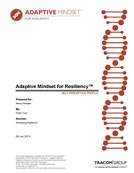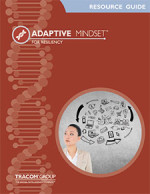A full-day course (or modified half day course) to build resiliency and high performance in a fast-paced world. Resiliency is a way to productively deal with workplace stress and overcome our brain’s natural, counter-productive ways of thinking. This course teaches people about the sources of their stress, their response patterns to stress, and practical strategies for altering those responses. The course includes the Adaptive Mindset for Resiliency Multi-Rater profile (or Self Perception). Facilitating this course requires certification. You may choose to certify your own staff or use TRACOM’s certified instructors to deliver convenient and effective on-site training
Introduction
• Welcome, Logistics, Agreements, Agenda, Objectives
• Participant Introductions
• Resilience Activity
• What is Resilience and Why Does it Matter?
• Resilience Benefits Exercise
• Change Exercise
Emotions, Behavior and the Brain
• Our Negativity Bias
• Our Emotional and Logical Brain
• Happiness Set-Point
Elements of Resiliency
• What does Resiliency Look Like?
• Resilient Mindset Model
Resilient Mindset Multi-Rater Profile Report
• Profile Description
• Multi-Rater Profile Discussion/ Breakout
• Resiliency Roadmap
Strategies for Developing Resiliency
• CAB/CAR and DRAINING
• Developing Mindfulness
• Acting “As If”
• Developing Gratitude
• Giving
• Setting Ambitious Goals
• Building the Resilience in Your Team
• The GROW Model
• Building Resilience Summary
Session Summary
• Summary and Headline Activity
• Next Steps
Session Conclusion
FILTER – How you filter information and interpret the world.
ACT – How you handle challenges.
INTERACT – How you communicate and connect with others.

